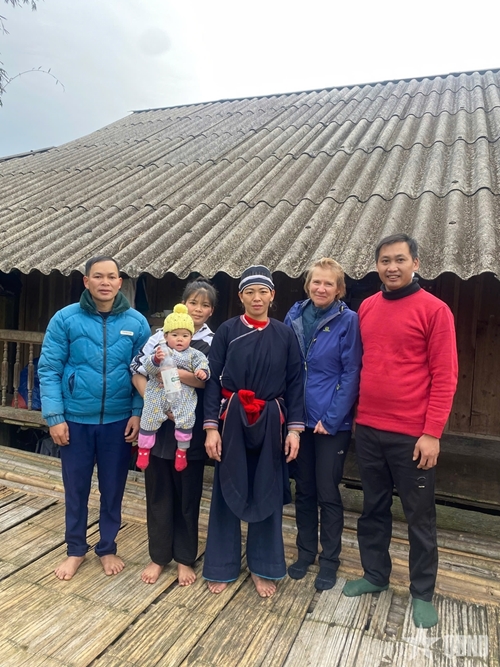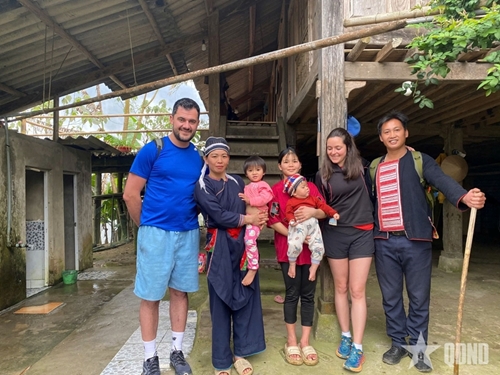Burning desire to rise
Kinh is a son of Nam Hong, a poor hamlet in Thong Nguyen commune, Hoang Su Phi district, Ha Giang province; thus he understands better than anyone the hardships local people face.
In 2009, he joined the military, serving in Regiment 98, Division 316. After being discharged, he was placed in the reserve force of Battalion 6, under the Hoang Su Phi District Military Command.
    |
 |
|
Trieu Menh Kinh (first from right) has successfully developed community-based tourism in his homeland. |
Witnessing the ongoing poverty of his family and neighbors, he began searching for new ways to improve local livelihoods and decided to explore tourism as a development path.
Kinh shared that he worked at Panhou Tourism and Trade Services Co., Ltd. in three years, where he could learn many things from knowledgeable and visionary people. These helped him develop a new mindset and direction for him and his homeland.
He had many sleepless nights dreaming of transforming his homeland’s challenges, including steep terrains that hinder transport and small rice terraces with limited economic efficiency, into unique tourism products that would bear the standout imprint of Hoang Su Phi.
Aware of his limited experience, in 2013, he decided to visit hotspots of community-based tourism, such as Bac Ha and Sa Pa in Lao Cai, Mai Chau in Hoa Binh, Dong Van and Meo Vac in Ha Giang. In each place, he spent months observing and learning how to organize, manage and develop community-based tourism effectively.
Overcoming first challenges and developing stronger
In 2015, with acquired knowledge and determination, Kinh started-up with VND 5 million. He renovated his family’s home to welcome guests, decorated with his Dao-inspired handcraft products and learnt to cook traditional dishes.
    |
 |
|
Trieu Menh Kinh (left) and foreign visitors |
The early days were tough. He had to go to each neighbor’s home, patiently explaining his vision, encouraging them to join him. He also popularized Nam Hong and its unique cultural experiences on social networks and via simple self-designed flyers.
His efforts were paid off. In early 2017, seeing encouraging results, Kinh and four other like-minded young men set up Nam Hong hamlet community-based tourism cooperative. Together, they pooled their resources to build small homestays imbued with local culture, organized traditional cultural and artistic exchanges, and guided guests to explore local natural beauty.
With the right approach, the cooperative has been expanded with more members, contributing to local people’s improved living standards, helping to reduce youth migration, and preserve traditional cultural identity. The cooperative has built the Hoang Su Phi Bungalow Resort, comprising 14 fully equipped bungalows and two communal houses and homestay areas. Last year, the cooperative’s revenue reached VND 1.8 billion and its workers’ income was VND 6-7 million per month per person on average.
Enthusiastic tour guide Trieu Mui Moang, who used to work far from home, shared that she is proud to share her ethnic group’s typical culture with visitors. “This job has helped me understand and love my homeland even more,” she said.
    |
 |
|
Trieu Menh Kinh (first from right), foreign visitors and local people in a group photo |
Thanks to its integrated tourism services with fresh local produce, friendly and culturally fluent tour guides, and typical art performances, the cooperative has been awarded a prestigious 4-star One Commune One Product (OCOP) certification from Ha Giang province.
For his remarkable and constant efforts, Trieu Menh Kinh has received numerous merit certificates, particularly the one from the Prime Minister in 2019.
“To me, community-based tourism is not just an economic model. It is a mission. It is about preserving and promoting the cultural and natural beauty of the homeland, while improving the lives of local people,” Kinh talked about his journey. He hoped that his experience would inspire other localities in Ha Giang province to develop community-based tourism to build a brighter future for the province.
Translated by Mai Huong